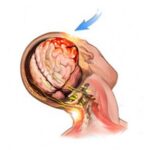What The Doctors Didn’t Immediately Notice
Some time ago I had a client, a middle-aged man, who had been involved in a violent t-bone collision.
The driver at fault had run a red light and broadsided my client’s vehicle. Thankfully, paramedics arrived on the scene and quickly transported my client to the emergency room where he was admitted with multiple fractured ribs.
After being in the hospital under close observation for 56 hours, there was no note made of any head injury.
When I went to visit him in his hospital room, he complained of multiple symptoms that I, having represented many cases, recognized as common symptoms of a person with a head injury. Some very obvious symptoms too, difficulty thinking clearly, headache, concentration issues, balance problems, irritability, and so on.
I was surprised that he had not been evaluated for a possible traumatic brain injury, especially given the force of the impact.
After challenging the matter, my client Stephen was referred to a specialist who diagnosed post-concussive syndrome. The specialist recommended vestibular physical therapy.
Several months after the collision, Stephen was still actively managing his condition.
Patients diagnosed with concussions have varying degrees and types of PCS symptoms. But in most cases, such an injury will have a serious and long-term impact on your physical, cognitive, and psychological function.
That’s why early diagnosis, referral, and patient education are critical to achieving the best possible recovery. Symptoms of a concussion may last weeks, months, or years; multiple concussions can have long-lasting life changes.
A Common Misconception About Concussions Caused by Car Accidents
Probably one of the most common misconceptions about a concussion or a traumatic brain injury is that you do not need to be hit in the head.
Many car accident victims, and even some doctors, will neglect the possibility of a concussion or PCS if the patient’s head was not directly impacted.
You don’t have to suffer a direct impact to the head or lose consciousness to have a concussion.
Anytime you take a jarring fall, you are put at risk of a concussion. Similar to whiplash, it may not be a direct hit to your head, but an overall jolt to your body that can cause a concussion. Car accidents are one of the most prevalent causes of concussions that are not sports-related.
A concussion after a car accident can be caused by a strike, blow or jolt to the head that occurs during the accident. Importantly, it can occur even if there is no impact on the head. It can also be caused by the extreme force of the crash, which causes the head to whip violently forward and backward.
When it comes to a car accident, recognizing the symptoms and properly diagnosing a concussion or head injury can make all the difference in achieving the best possible recovery.
If not properly diagnosed and treated, a concussion can have a lasting physical and mental impact.
To help you understand and recognize the symptoms of a concussion caused by an automobile accident, and to give you some advice on what you can do, I will be writing a short e-book which will be available for download on my website.
The purpose of this free e-book will be to help improve the awareness of concussion and traumatic head injuries that resulted from an automobile accident.
Getting a proper diagnosis immediately can lead to faster recovery and appropriate compensation.
Written by
Doug Horn
Attorney at Law





